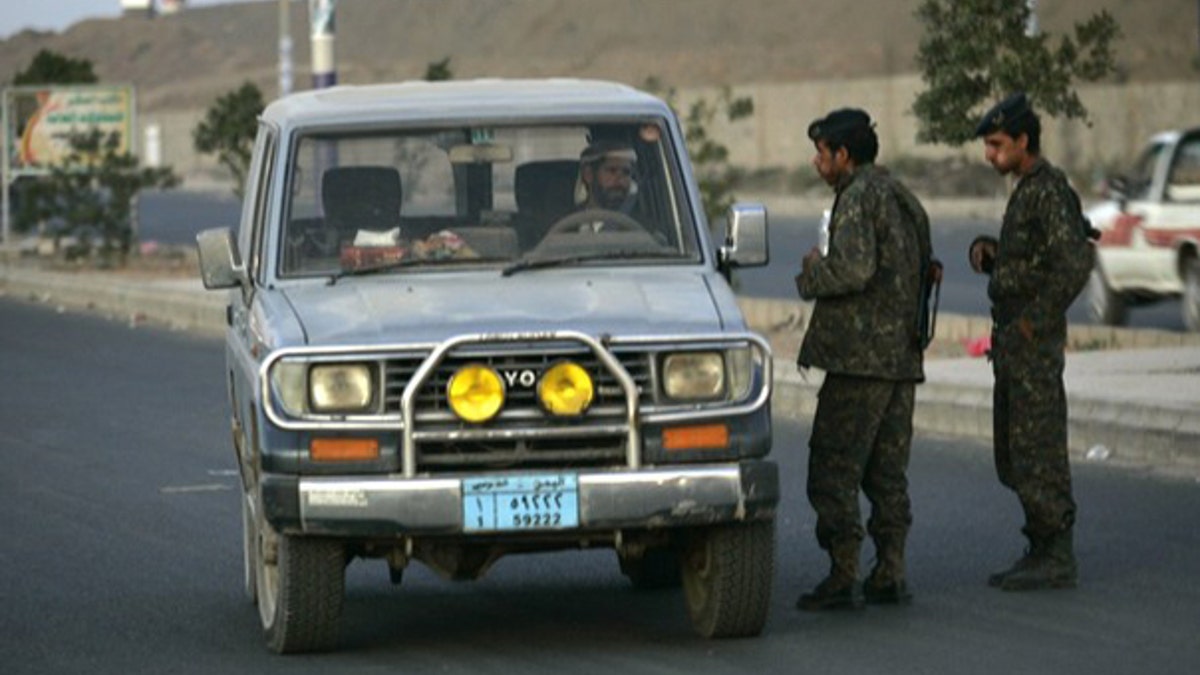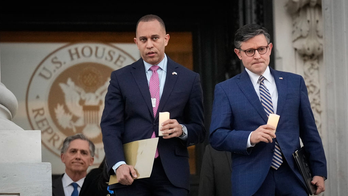
Soldiers inspect cars on a road in Sanaa, Yemen, Jan. 3. (Reuters Photo)
The Obama administration, facing a growing terrorist threat out of Yemen, is turning to a counterterror tool that for the past four years has allowed the United States to battle extremism in dozens of countries outside the official war zones of Iraq and Afghanistan: cold, hard cash.
The Pentagon since 2006 has budgeted more than $1 billion to train and equip foreign militaries and security forces through a program known in Congress as "Section 1206." Pakistan has absorbed more of that money than any other country, but other nations -- most notably Yemen -- are rising in prominence on the list of recipients.
Gen. David Petraeus, head of Central Command, announced on a surprise visit to Yemen over the weekend that the United States will more than double its counterterrorism funding -- $67 million in fiscal 2009 -- to the country.
Yemen received renewed attention after a terror attack on the U.S. Embassy there in 2008. The attempted bombing of a Detroit-bound flight on Christmas has brought the country into focus once again as a staging ground for extremists. Aided by U.S. funds, the Yemeni government has stepped up attacks on terror targets inside its borders.
Pentagon spokesman Bryan Whitman said Monday that he couldn't pinpoint exactly how high the funding would be for any country in the year ahead, but he said the Pentagon is working on a proposal with the State Department.
"We are working along with the Department of State to draft [Section] 1206 proposals that would help build Yemen's counterterrorism capacity, as we are with many of our regional partners," Whitman said.
The more than $200 million in Pakistan funding over the years has gone toward building up the country's military helicopter fleet, intelligence infrastructure, explosive investigation units and other areas. The Yemen funding has gone toward the country's Air Force and Coast Guard, along with other security programs.
But the list of recipients is long, and gives an idea of how the administration is prioritizing the threats posed by countries other than Iraq and Afghanistan. The following are countries that received Section 1206 funding in fiscal 2009:
Pakistan: $113.5 million
Yemen: $67.2 million
Lebanon: $49.3 million
Philippines: $22.6 million
Bahrain: $16.2 million
Kenya: $15.2 million
Ethiopia: $10.3 million
Kyrgyzstan: $9.6 million
Tunisia: $8.8 million
Bangladesh: $8.5 million
Djibouti: $3.5 million
Nigeria: $1.5 million
Mozambique, Tanzania, Mauritius, Seychelles (combined): $8.6 million
Aid to African and central Asian countries went down last year as aid to Pakistan and Yemen rose significantly.
President Obama is also seeking a significant increase in Yemen funding from a separate pot of State Department money for "development and security assistance." According to the State Department, that funding for Yemen could rise from $40 million last year to $63 million in the year ahead.
As for the Pentagon program, Congress has set aside a total of $350 million for all countries in 2010 under Section 1206 -- the section of the defense budget that deals with the program.
Obama seemed to reference this funding in his weekend radio address, highlighting the "new partnerships" the United States has forged to "put unrelenting pressure on these extremists wherever they plot and train -- from East Africa to Southeast Asia, from Europe to the Persian Gulf."
White House counterterrorism adviser John Brennan told "Fox News Sunday" that while the United States will not open a "second front" in Yemen, it will continue to work with the country's government. He cited evidence that the suspect in the attempted bombing of a Northwest Airlines flight, Umar Farouk Abdulmutallab, traveled to Yemen and reached out to Al Qaeda.
"We're concerned that they may be, in fact, trying to get other operatives, non-Yemenis and others, to train inside of Yemen, to send to the West," Brennan said. "And that's why we need to make sure that we maintain this pressure on Al Qaeda within Yemen."
Lt. Col. Tony Shaffer, director of external communications for the Center for Advanced Defense Studies, said the United States should also work more closely with Saudi Arabia in addressing the problem in Yemen. He said increased U.S. funding could "do some good," but that it needs to have conditions and benchmarks attached.
"We have to look at what we did with Pakistan. We gave Pakistan tons of money with no accountability. It didn't work," he said. "If we give (Yemen) the money, we have to expect something in return. ... If we don't do that, we'll throw good money after bad."
But Robert Jordan, former U.S. ambassador to Saudi Arabia, described the support as a needed alternative to sending troops.
"Landing troops (in Yemen) would be a symbolic act that would simply outrage the population," he said. We've got to give the host government, the local government the tools to work with."
Fox News' Justin Fishel contributed to this report.




